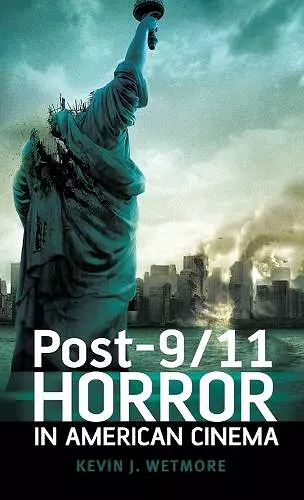Post-9/11 Horror in American Cinema
Format:Hardback
Publisher:Continuum Publishing Corporation
Published:31st May '12
Currently unavailable, and unfortunately no date known when it will be back

Examines how horror cinema has changed as a result of 9/11 and, conversely, how horror films construct and give meaning to 9/11.
Illustrates how contemporary horror films explore visceral and emotional reactions to the attacks and how they underpin audiences' fears about their safety. This title examines how scary movies have changed as a result of 9/11 and, conversely, how horror films construct and give meaning to the event in a way that other genres do not.The horror film is meant to end in hope: Regan McNeil can be exorcized. A hydrophobic Roy Scheider can blow up a shark. Buffy can and will slay vampires. Heroic human qualities like love, bravery, resourcefulness, and intelligence will eventually defeat the monster. But, after the 9/11, American horror became much more bleak, with many films ending with the deaths of the entire main cast. "Post-9/11 Horror in American Cinema" illustrates how contemporary horror films explore visceral and emotional reactions to the attacks and how they underpin audiences' ongoing fears about their safety. It examines how scary movies have changed as a result of 9/11 and, conversely, how horror films construct and give meaning to the event in a way that other genres do not. Considering films such as Quarantine, Cloverfield, Hostel and the Saw series, Wetmore examines the transformations in horror cinema since 9/11 and considers not merely how the tropes have changed, but how our understanding of horror itself has changed.
This provocative and engaging study maps the transformation of the horror genre in the aftermath of 9/11, arguing that the hopelessness characterizing contemporary horror reflects the psychological and social impact of terrorism on American culture. Wetmore makes important links between the fear of terrorism and horror films, and he demonstrates—quite compellingly—that the horror genre has been one of the most effective tools for making sense of real terror. --Thomas Fahy, editor of The Philosophy of Horror and author of Sleepless and The Unspoken
On 9/11, horror unfolded in real life. Kevin Wetmore shows how its fallout infused the horror genre in cinema. His writing is clear, sharp and passionate. His book will appeal to fans of the horror film and to everyone interested in contemporary culture and its connections with historical trauma. -Stephen Prince, author of Firestorm: American Film in the Age of Terrorism
Post-9/11 Horror in American Cinema is a pleasure to read. Lively and astute, this wide-ranging survey of the recent horror film landscape demonstrates how the genre has changed after 9/11, both thematically and stylistically, to better echo our collective memory of an experience that continues to haunt us. Laden with visual and experiential references to 9/11, horror films represent trauma in box-office friendly fashion to echo our fears and ambivalence about torture, chaos, violence, and death. Rich with close film readings, this book will appeal to horror fans and film students alike. -- Isabel C. Pinedo, author of Recreational Terror: Women and the Pleasures of Horror Film Viewing, Film and Media, Hunter College CUNY
Post-9/11 Horror in American Cinema is a well-argued and researched investigation into the extreme trends of the genre. For both the connoisseur of horror and the academic, it presents an interesting vivisection of America’s popculture response to a national trauma. * Media International Australia *
Post 9/11 Horror in American Cinema is a fascinating read that deconstructs the changes, both major and minor, in horror films since 2001. The author’s theories are thought-provoking, well-supported by citation, and disturbing in an intellectually attractive way. While it tackles the subject from an academic perspective, the writing is extremely accessible. I highly recommend the book. -- David Indish * Bricks of the Dead *
ISBN: 9781441132956
Dimensions: unknown
Weight: unknown
248 pages